第20章
Two or three days ago we noted an unusual though subdued air of excitement at 22 Breadalbane Terrace, where for a week we had been the sole lodgers. Mrs. Menzies, whom we call Mingess, has returned to Kilconquhar, which she calls Kinyuchar; Miss Cockburn-Sinclair has purchased her wedding outfit and gone back to Inverness, where she will be greeted as Coburn-Sinkler; the Hepburn-Sciennes will be leaving to-morrow, just as we have learned to pronounce their names; and the sound of the scrubbing-brush is heard in the land. In corners where all was clean and spotless before, Mrs. M'Collop is digging with the broom, and the maiden Boots is following her with a damp cloth. The stair carpets are hanging on lines in the back garden, and Susanna, with her cap rakishly on one side, is always to be seen polishing the stair-rods. Whenever we traverse the halls we are obliged to leap over pails of suds, and Miss Diggity-Dalgety has given us two dinners which bore a curious resemblance to washing-day repasts in suburban America.
"Is it spring house-cleaning?" I ask Mistress M'Collop.
"Na, na," she replies hurriedly; "it's the meenisters."
On the 19th of May we are a maiden castle no longer. Black coats and hats ring at the bell, and pass in and out of the different apartments. The hall table is sprinkled with letters, visiting- cards, and programmes which seem to have had the alphabet shaken out upon them, for they bear the names of professors, doctors, reverends, and very reverends, and fairly bristle with A.M.'s, M.A.'s, A.B.'s, D.D.'s, and LL.D.'s. The voice of family prayer is lifted up from the dining-room floor, and paraphrases and hymns float down the stairs from above. Their Graces the Lord High Commissioner and the Marchioness of Heatherdale will arrive to-day at Holyrood Palace, there to reside during the sittings of the General Assembly of the Church of Scotland, and to-morrow the Royal Standard will be hoisted at Edinburgh Castle from reveille to retreat. His Grace will hold a levee at eleven. Directly His Grace leaves the palace after the levee, the guard of honour will proceed by the Canongate to receive him on his arrival at St. Giles' Church, and will then proceed to Assembly Hall to receive him on his arrival there. The Sixth Inniskilling Dragoons and the First Battalion Royal Scots will be in attendance, and there will be Unicorns, Carricks, pursuivants, heralds, mace-bearers, ushers, and pages, together with the Purse-bearer, and the Lyon King-of-Arms, and the national anthem, and the royal salute; for the palace has awakened and is `mimicking its past.'
`Should the weather be wet, the troops will be cloaked at the discretion of the commanding officer.' They print this instruction as a matter of form, and of course every man has his macintosh ready. The only hope lies in the fact that this is a national function, and `Queen's weather' is a possibility. The one personage for whom the Scottish climate will occasionally relax is Her Majesty Queen Victoria, who for sixty years has exerted a benign influence on British skies and at least secured sunshine on great parade days.
Such women are all too few!
In this wise enters His Grace the Lord High Commissioner to open the General Assembly of the Church of Scotland; and on the same day there arrives by the railway (but travelling first class) the Moderator of the Church of Scotland Free, to convene its separate supreme Courts in Edinburgh. He will have no Union Jacks, Royal Standards, Dragoons, bands, or pipers; he will bear his own purse and stay at an hotel; but when the final procession of all comes, he will probably march beside His Grace the Lord High Commissioner, and they will talk together, not of dead-and-gone kingdoms, but of the one at hand, where there are no more divisions in the ranks, and where all the soldiers are simply `king's men,' marching to victory under the inspiration of a common watchword.
It is a matter of regret to us that the U.P.'s, the third branch of Scottish Presbyterianism, could not be holding an Assembly during this same week, so that we might the more easily decide in which flock we really belong. 22 Breadalbane Terrace now represents all shades of religious opinion within the bounds of Presbyterianism.
We have an Elder, a Professor of Biblical Criticism, a Majesty's Chaplain, and even an ex-Moderator under our roof, and they are equally divided between the Free and the Established bodies.
Mrs. M'Collop herself is a pillar of the Free Kirk, but she has no prejudice in lodgers, and says so long as she `mak's her rent she doesna care aboot their releegious principles.' Miss Diggity-Dalgety is the sole representative of United Presbyterianism in the household, and she is somewhat gloomy in Assembly time. To belong to a dissenting body, and yet to cook early and late for the purpose of fattening one's religious rivals, is doubtless trying to the temper; and then she asserts that `meenisters are aye tume [empty].'
"You must put away your Scottish ballads and histories now, Salemina, and keep your Concordance and your umbrella constantly at hand."
This I said as we stood on George IV. Bridge and saw the ministers glooming down from the Mound in a dense Assembly fog. As the presence of any considerable number of priests on an ocean steamer is supposed to bring rough weather, so the addition of a few hundred parsons to the population of Edinburgh is believed to induce rain,--or perhaps I should say, more rain.